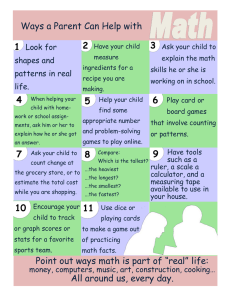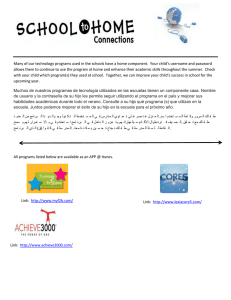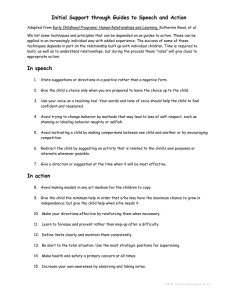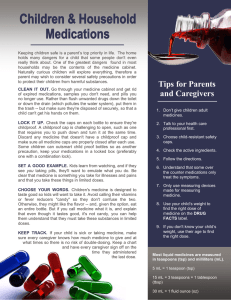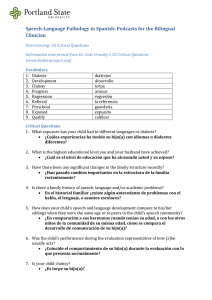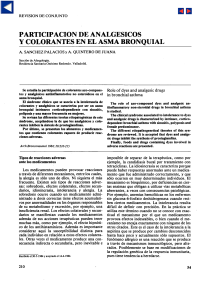La aspirina Aspirin - Children`s Hospitals and Clinics of Minnesota
Anuncio
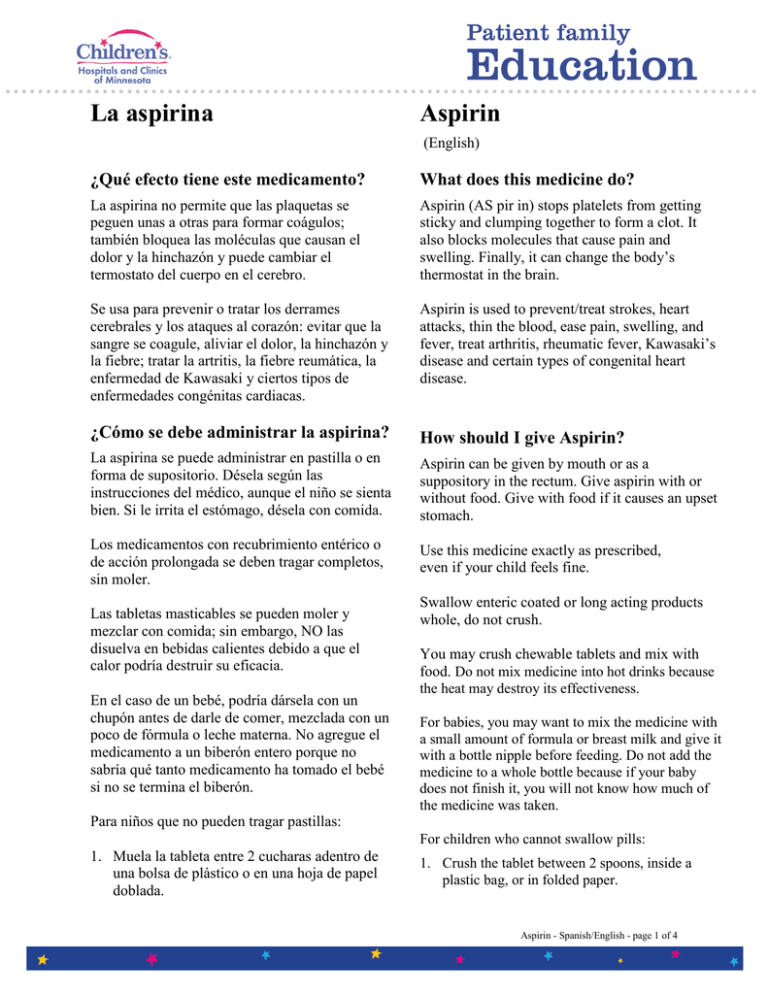
La aspirina Aspirin (English) ¿Qué efecto tiene este medicamento? What does this medicine do? La aspirina no permite que las plaquetas se peguen unas a otras para formar coágulos; también bloquea las moléculas que causan el dolor y la hinchazón y puede cambiar el termostato del cuerpo en el cerebro. Aspirin (AS pir in) stops platelets from getting sticky and clumping together to form a clot. It also blocks molecules that cause pain and swelling. Finally, it can change the body’s thermostat in the brain. Se usa para prevenir o tratar los derrames cerebrales y los ataques al corazón: evitar que la sangre se coagule, aliviar el dolor, la hinchazón y la fiebre; tratar la artritis, la fiebre reumática, la enfermedad de Kawasaki y ciertos tipos de enfermedades congénitas cardiacas. Aspirin is used to prevent/treat strokes, heart attacks, thin the blood, ease pain, swelling, and fever, treat arthritis, rheumatic fever, Kawasaki’s disease and certain types of congenital heart disease. ¿Cómo se debe administrar la aspirina? How should I give Aspirin? La aspirina se puede administrar en pastilla o en forma de supositorio. Désela según las instrucciones del médico, aunque el niño se sienta bien. Si le irrita el estómago, désela con comida. Aspirin can be given by mouth or as a suppository in the rectum. Give aspirin with or without food. Give with food if it causes an upset stomach. Los medicamentos con recubrimiento entérico o de acción prolongada se deben tragar completos, sin moler. Use this medicine exactly as prescribed, even if your child feels fine. Las tabletas masticables se pueden moler y mezclar con comida; sin embargo, NO las disuelva en bebidas calientes debido a que el calor podría destruir su eficacia. En el caso de un bebé, podría dársela con un chupón antes de darle de comer, mezclada con un poco de fórmula o leche materna. No agregue el medicamento a un biberón entero porque no sabría qué tanto medicamento ha tomado el bebé si no se termina el biberón. Swallow enteric coated or long acting products whole, do not crush. You may crush chewable tablets and mix with food. Do not mix medicine into hot drinks because the heat may destroy its effectiveness. For babies, you may want to mix the medicine with a small amount of formula or breast milk and give it with a bottle nipple before feeding. Do not add the medicine to a whole bottle because if your baby does not finish it, you will not know how much of the medicine was taken. Para niños que no pueden tragar pastillas: For children who cannot swallow pills: 1. Muela la tableta entre 2 cucharas adentro de una bolsa de plástico o en una hoja de papel doblada. 1. Crush the tablet between 2 spoons, inside a plastic bag, or in folded paper. Aspirin - Spanish/English - page 1 of 4 2. Mezcle el polvo con una cantidad muy pequeña (como1 cucharadita) de comida blanda, por ejemplo, puré de manzana, jarabe de chocolate, helado, mermelada o yogurt. Asegúrese de que el niño se tome todo. 2. Mix the powder with a very small amount (about 1 teaspoon) of soft food, such as applesauce, chocolate syrup, ice cream, jelly, or yogurt. Make sure your child takes all of the mixture. ¿Se deben evitar algunos alimentos o medicamentos mientras se esté tomando la aspirina? Are there any precautions about food or other medicines? Si le han recetado la aspirina, NO DEBE TOMAR: • Cualquier otro tipo de anticoagulante como la warfarina (Coumadin® u otra marca) • Ibuprofeno o medicamentos antiinflamatorios no esteroides (AINE) While on aspirin, DO NOT TAKE: • any other type of blood thinner medicine, such as warfarin (Coumadin®, or another brand) • ibuprofen or non-steroidal antiinflammatory drugs (NSAIDs) Consulte con el médico, la enfermera especialista o el farmaceuta antes de administrar cualquier otro medicamento o producto herbal o vitamínico de venta libre o con receta. Check with the doctor, nurse practitioner, or pharmacist before giving any other prescription or non-prescription medicines, herbs, or vitamins. ¿Qué se debe hacer si se olvida una dosis? What should I do if a dose is missed? Si olvida darle una dosis, désela tan pronto lo recuerde, salvo si faltan menos de 6 horas para la siguiente dosis. En tal caso, espere y vuelva al horario normal. Nunca administre una dosis doble. ¿Cuáles son los efectos secundarios? • Ocasionales • • • • Raros Dolor de estómago Agruras Náusea o vómito Sangrados Vomitar sangre o algo que parece café molido If a dose is missed, give it as soon as you remember, unless it is less than 6 hours until the next dose. In that case, skip the missed dose and continue with the regular schedule. Never give a double dose. What are the side effects? Occasional Rare • • • • Stomach pain Heartburn Nausea and/or vomiting Bleeding problems • Throwing up blood or something that looks like coffee grounds. Aspirin - Spanish/English - page 2 of 4 ¿Cuándo se debe llamar a la clínica? When should I call the clinic? Llame a la clínica si: • El niño tiene un sangrado que no para • El niño tiene la piel pálida y le salen moretones fácilmente • Hace del baño heces negras, alquitranadas o sanguinolentas • Le duele la cabeza muy fuerte • Le zumban los oídos • Se le hinchan o le duelen las piernas • Sufre de entumecimiento, debilidad, confusión, mareo o dolor de cabeza repentinos • Muestra señales de una reacción alérgica: - Ronchas o salpullido - Silbido en el pecho - Dificultad para respirar - llame al 911 • • • • • • • ¿Qué más es necesario saber? What else do I need to know? • • Do not give children or teenagers aspirin for flu symptoms or chickenpox due to the chance of Reye’s syndrome. This can cause severe problems to the brain and liver. • Store tablets at room temperature and protect from light and water. Do not store in a bathroom. Store suppositories in the refrigerator. • • • • • No se debe administrar aspirina ni a niños ni a adolescentes para tratar los síntomas de la influenza o la varicela debido a la posibilidad de que se presente el síndrome de Reye, el cual puede causar daños graves en el cerebro y el hígado. Las pastillas se deben almacenar a temperatura ambiente y protegidas de la luz y el agua. No las almacene en el baño. Los supositorios se deben almacenar en el refrigerador. Es importante que usted y el niño sepan los nombres y las dosis de todos los medicamentos que está tomando y compartan esta información con todos aquéllos al cuidado del niño. Traiga el frasco del medicamento cada vez que lleve al niño a la clínica o a la sala de emergencias. Tenga siempre suficiente medicamento a la mano. Revise la etiqueta y la fecha de caducidad antes de administrar cada dosis. • • Bleeding that won’t stop Pale skin with easy bruising Black, tarry, or bloody stools Bad headache Ringing in the ears Swelling or pain in one or both legs Sudden numbness, weakness, confusion, dizziness, or headache Signs of allergic reaction: - rash or hives - wheezing - trouble breathing - call 911 • You and your child should know the names and doses of all medicines he or she is taking. Share this information with anyone involved in your child’s care. • Bring the medicine container when your child comes to the clinic or emergency department. • Always make sure you have enough medicine on hand. Check the label and expiration date before giving each dose. Aspirin - Spanish/English - page 3 of 4 • • Almacene todos los medicamentos en su frasco original lejos de la luz del sol y el calor y fuera del alcance de los niños. No los almacene en lugares húmedos como el baño y guárdelos bajo llave de ser posible. En caso de una sobredosis o de tomar el medicamento equivocado, llame al Centro de Toxicología al 1-800-222-1222. Si el niño está inconsciente o tiene una convulsión, llame al 911. • • Store all medicines in their original containers and away from direct sunlight or heat. Do not store in humid places such as the bathroom. Keep them out of children’s reach. Lock the medicine up if possible. If too much or the wrong kind of medicine is taken, call the Poison Control Center at 1800-222-1222. If your child is unconscious or has a seizure, call 911. ¿Tiene más preguntas? Questions? Esta hoja no contiene información especifica para su hijo, sino información general. Si tiene alguna pregunta, llame a la clínica o la farmacia. This sheet is not specific to your child but provides general information. If you have any questions, please call your clinic or pharmacy. Si desea leer más sobre éste y otros temas de la salud, llame o visite la biblioteca del Centro de Recursos para la Familia (Family Resource Center) o visite nuestra pagina del internet en www.childrensmn.org/A-Z. For more reading material about this and other health topics, please call or visit the Family Resource Center library, or visit our website at www.childrensmn.org/A-Z. Children’s Hospitals and Clinics of Minnesota Patient/Family Education 2525 Chicago Avenue South Minneapolis, MN 55404 Last Reviewed 12/12 Copyright Children’s Hospitals and Clinics of Minnesota Patient/Family Education 2525 Chicago Avenue South Minneapolis, MN 55404 Last Reviewed 12/12 Copyright Aspirin - Spanish/English - page 4 of 4
